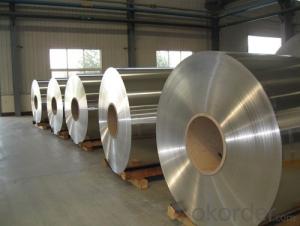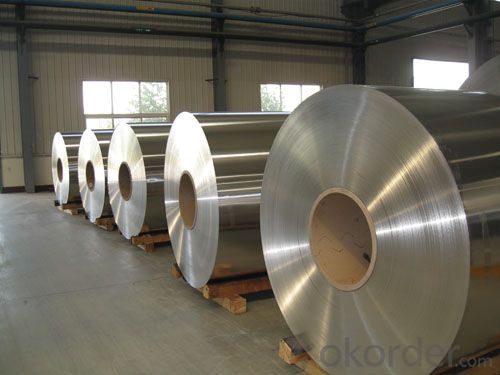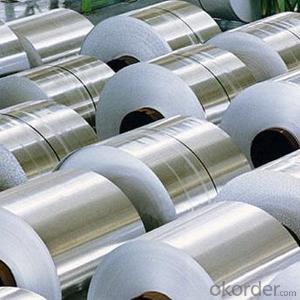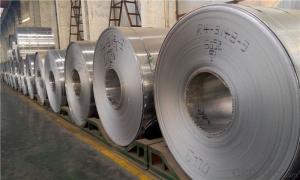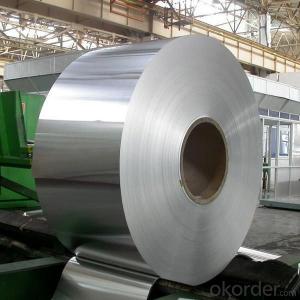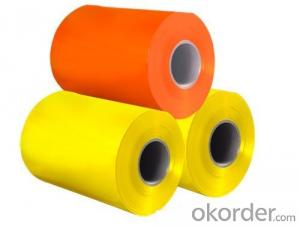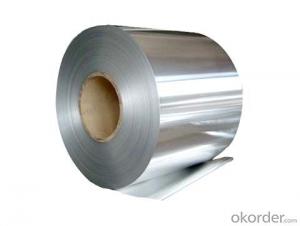1100 H14 Mill Finished Aluminum Coil for Decoration Materials Production
- Loading Port:
- Shanghai
- Payment Terms:
- TT OR LC
- Min Order Qty:
- 1 m.t.
- Supply Capability:
- 60000 m.t./month
OKorder Service Pledge
OKorder Financial Service
You Might Also Like
Specification
Mill Finished Aluminium Coil For Decoration Materials Production
Alloy | 1050, 1060,1100, 3003 3004 3105 3A21 5005 5052 etc |
Temper | O/H12/H14/H1/H18/H32/H34/H36/H38//H111/H112/H116/H321/T6/T651/T3/T351 etc |
Thickness | 0.1mm to 6mm |
Width | 20mm to 3300mm |
Coil weight | 100kgs to 6 tons depends on actual requirement |
Core material | Aluminum or paper |
Coil inner diameter | 75mm, 150mm, 200mm, 300mm, 405mm, 505mm or as required |
Appplication | construction, roofing, decoration, lamping etc |
Package | eye to wall or eye to the wall for aluminum coil with wood pallet (wooded case also available) |
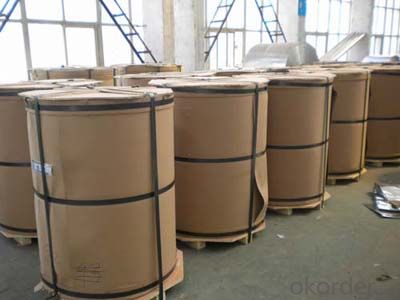
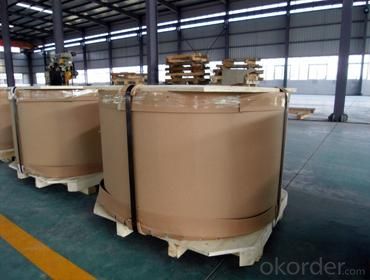
3) Glass curtain wall frame
4) Interior decoration
5) Elevator decoration
6) Signs, nameplate, bags making.
7) Automobile parts material
8) Office and Household appliances: HVAC equipments
9) The consumer electronics: mobile phones, digital cameras, MP3 .etc.
Coating varieties
Polyester Coatings (PE)
PE (polyester) coatings exhibit an excellent combination of hardness, flexibility, flow, appearance, and superior resistance to dirt retention in indoor and outdoor applications. These coatings are highly resistant to abrasion, metal marking, staining, and marring, and require minimal maintenance. Glazetech uses polyester paints which provide excellent colour and gloss retention properties.
Polyvinylidene Fluoride Coatings (PVDF)
PVDF (polyvinylidene fluoride) is a chemical resistant thick film barrier coating commonly used in architectural applications where both excellent appearance and substrate protection must be maintained over a long period of time. This coating is unaffected by most chemicals and solvents and has excellent wear and abrasion resistance. PVDF also has a high dielectric strength, excellent resistance to weathering and the ability to self extinguish.
FAQ
--Q: Do you provide free samples?
--A: Yes, free samples will be sent to you on freight at destination.
--Q: Can I get your latest products catalogue?
--A: Yes, it will be sent to you in no time.
--Q: What is the MOQ?
--A: 2 tons
--Q: What are your payment terms?
--A: We accept L/C, T/T.
--Q: What kinds of alloy can you supply?
--A: 1000 series: 1050, 1060, 1070, 1100, 1145, 1200
3000 series: 3003, 3004, 3105, 3104
5000 series: 5052, 5083, 5754, 5182
6000 series: 6061, 6063, 6062, 6063
8000 series: 8011, 8021
--Q: What’s the coating of top side?
--A: PVDF and PE coating
--Q: What kinds of temper can you supply?
--A: O-H112: O,H12,H14,H16,H18,H22,H24,H26,H,32,H34,H111,H112
T3, T4, T6
- Q: What will be the pros and cons of using each of these materials?One thing to keep in mind is that aluminum alloys are good conductors of electricity.
- Alloy Ladders
- Q: What is the role of aluminum coils in the construction of ships?
- The marine industry heavily relies on aluminum coils for the construction of ships. These coils are essential in manufacturing various ship components and structures. The lightweight nature of aluminum coils is a significant advantage in ship construction. Compared to traditional steel, aluminum is much lighter, resulting in improved fuel efficiency and overall performance of the ship. This is particularly beneficial for larger vessels, as reducing weight helps minimize energy consumption and operating costs. Furthermore, aluminum coils offer outstanding resistance to corrosion, making them ideal for the harsh marine environment. Ships constantly face exposure to corrosive saltwater, which can deteriorate metal materials. By utilizing aluminum coils, shipbuilders can ensure that their vessels are well-protected against rust and corrosion, ultimately extending their lifespan and reducing maintenance needs. Additionally, aluminum coils are easily shaped and formed into various structures, providing shipbuilders with greater design flexibility. This versatility allows for the creation of intricate ship components like hulls, superstructures, and bulkheads. Aluminum's excellent weldability also simplifies the process of joining different sections of the ship, resulting in more efficient and streamlined construction. Moreover, aluminum is a highly sustainable material. It can be recycled without any loss in quality or performance, making aluminum coils an environmentally friendly choice for ship construction. This aligns with the increasing focus on sustainability in the industry. In conclusion, aluminum coils play a multifaceted role in ship construction. They offer lightweight, corrosion-resistant, and easily formable materials that contribute to improved fuel efficiency, durability, and design flexibility. Additionally, their recyclability makes them an environmentally conscious option. Overall, aluminum coils are a vital component in building efficient, durable, and sustainable ships.
- Q: What are the different grades of aluminum used in coil production?
- The different grades of aluminum used in coil production typically include 1100, 3003, and 5052. These grades vary in terms of their composition and properties, allowing for specific applications and requirements in various industries.
- Q: I was told today that taking aluminium inside your body greatly increases the chance of getting alzheimers as they destroy cells. What foods contain aluminium?
- challenging task. do a search over bing and yahoo. that will might help!
- Q: Can aluminum coils be coated with protective films?
- Yes, aluminum coils can be coated with protective films. These films are typically made of a variety of materials, such as polyester or polyethylene, and are applied to the aluminum coils using adhesive or heat bonding. The purpose of these protective films is to prevent damage, scratches, or corrosion to the surface of the aluminum coils during storage, transportation, or processing. The films act as a barrier, shielding the coils from external factors such as moisture, dirt, or chemicals. Additionally, certain protective films can also provide temporary UV protection. Overall, coating aluminum coils with protective films is a common practice in various industries to ensure the quality and integrity of the coils are maintained throughout their handling and use.
- Q: How are aluminum coils different from other types of metal coils?
- Aluminum coils differ from other types of metal coils in several ways. Firstly, aluminum is a lightweight metal, making aluminum coils much lighter compared to coils made from other metals such as steel or copper. This lightweight property of aluminum makes it a popular choice for various industries where weight is a critical factor, such as aerospace and automotive industries. Secondly, aluminum coils have excellent corrosion resistance. Unlike other metals, aluminum forms a protective oxide layer on its surface when exposed to air, preventing further corrosion. This resistance to corrosion makes aluminum coils suitable for applications in humid and corrosive environments, such as marine or coastal areas. Additionally, aluminum coils possess high thermal conductivity. This means that aluminum can efficiently conduct heat, making it an ideal material for heat transfer applications like HVAC systems, refrigeration units, and radiators. The high thermal conductivity of aluminum coils allows for more efficient cooling or heating processes. Furthermore, aluminum is highly malleable and ductile, which means it can be easily shaped and formed without losing its structural integrity. This malleability makes aluminum coils flexible and versatile, allowing them to be manufactured into various shapes and sizes to meet specific industry requirements. Lastly, aluminum is a highly sustainable and recyclable material. It can be recycled repeatedly without losing its quality or performance, making aluminum coils an environmentally friendly choice. This recyclability factor contributes to reducing the environmental impact and promoting a circular economy. In summary, aluminum coils stand out from other metal coils due to their lightweight, corrosion resistance, high thermal conductivity, malleability, and recyclability. These unique properties make aluminum coils a preferred choice for a wide range of applications across different industries.
- Q: How are aluminum coils used in the production of gutters and downspouts?
- Aluminum coils play a crucial role in the production of gutters and downspouts. These coils are used as the primary material to manufacture seamless gutters, which are known for their durability, longevity, and aesthetic appeal. To begin the production process, the aluminum coils are fed into a specialized gutter machine. This machine shapes the coils into the desired gutter profile, typically in the form of a long continuous piece. The coil is then cut into appropriate lengths to match the measurements of the gutter system required for a specific building or project. Once cut, the aluminum coil is then shaped and formed using various bending and folding techniques. This allows the coil to be transformed into the seamless gutter shape needed to efficiently collect and channel rainwater away from the roof and foundation of a building. The seamless design eliminates the risk of leaks and enhances the overall functionality of the gutter system. Additionally, the aluminum coils used in gutter production offer several advantages. Firstly, aluminum is lightweight yet sturdy, making it an ideal material for gutters and downspouts. It is resistant to rust and corrosion, ensuring the longevity of the gutter system even in harsh weather conditions. Furthermore, aluminum is highly malleable, allowing for customized shapes and sizes to fit the specific requirements of different buildings. In conclusion, aluminum coils are an integral component in the production of gutters and downspouts. They are used to create seamless gutters that are aesthetically pleasing, durable, and highly functional. The use of aluminum as the primary material ensures long-lasting performance, resistance to corrosion, and customization options for various architectural needs.
- Q: Domestic production of color coated aluminum coil manufacturers which good?
- It is widely used in the field of architectural decoration, such as aluminum ceiling, aluminum plate and so on. There are many manufacturers of color coated aluminum rolls, big and small.
- Q: Are there any safety concerns when handling aluminum coils?
- Yes, there are some safety concerns when handling aluminum coils. One of the main concerns is the risk of injury from sharp edges. Aluminum coils are typically formed into long, thin sheets that can have sharp edges. It is important to handle them with care and wear appropriate protective gloves to avoid cuts and abrasions. Another safety concern is the potential for injury due to the weight of the coils. Aluminum coils can be quite heavy, especially when they are stacked together. It is important to use proper lifting techniques and equipment to prevent strains and back injuries. Additionally, there is a potential risk of fire when handling aluminum coils. Aluminum is a highly flammable material and can ignite if exposed to sparks, open flames, or high temperatures. It is crucial to store and handle aluminum coils away from any potential ignition sources and ensure that the area is well-ventilated to prevent the buildup of flammable vapors. Finally, it is important to be aware of the potential health risks associated with aluminum. While aluminum itself is not considered highly toxic, there is some evidence to suggest that prolonged exposure to high levels of aluminum can be harmful to human health. Therefore, it is important to take appropriate precautions, such as wearing respiratory protection when working with aluminum coils in dusty environments and following proper hygiene practices to minimize the risk of exposure. Overall, with proper training, precautions, and adherence to safety guidelines, the risks associated with handling aluminum coils can be minimized.
- Q: Can aluminum coils be used in vacuum applications?
- Indeed, aluminum coils are capable of being employed in vacuum applications. Aluminum, being a frequently utilized substance in vacuum systems, possesses exceptional attributes including low outgassing, high thermal conductivity, and commendable corrosion resistance. Consequently, these qualities render aluminum coils suitable for a diverse array of vacuum applications, encompassing, but not restricted to, vacuum chambers, vacuum pumps, cryogenic systems, and particle accelerators. Nevertheless, it is crucial to acknowledge that aluminum may react with particular gases or chemicals. Hence, it is imperative to carefully evaluate the specific necessities and compatibility of the vacuum application prior to employing aluminum coils.
Send your message to us
1100 H14 Mill Finished Aluminum Coil for Decoration Materials Production
- Loading Port:
- Shanghai
- Payment Terms:
- TT OR LC
- Min Order Qty:
- 1 m.t.
- Supply Capability:
- 60000 m.t./month
OKorder Service Pledge
OKorder Financial Service
Similar products
Hot products
Hot Searches
Related keywords
